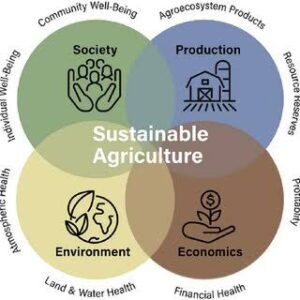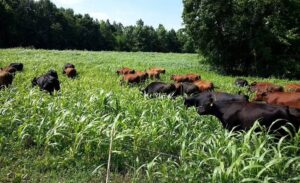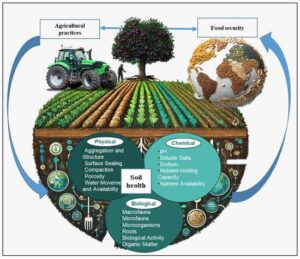Back to: Environmental Biology 300 Level
Welcome to class!
Hello superstar learner! Have you ever thought about how we can grow enough food for everyone without harming the soil, water, or the environment? Imagine a farm that produces enough maize, yam, or tomatoes year after year, without drying up the land or polluting the rivers. That’s what sustainable agriculture is all about. Today’s lesson will help you understand how farming and nature can work hand-in-hand through agroecosystems.
Sustainable Agriculture And Agroecosystems
What is Sustainable Agriculture?
Sustainable agriculture is the practice of farming in a way that meets today’s food needs without compromising the ability of future generations to meet theirs. It means producing food, fibre, and livestock in a way that protects the environment, supports farmers’ livelihoods, and builds healthy communities.

In Nigeria, this could mean using compost instead of chemical fertilisers, planting a mix of crops instead of just one, or protecting water sources near farms. The focus is not just on yields but on long-term productivity and environmental care.
Understanding Agroecosystems
An agroecosystem is an agricultural system that functions like an ecosystem. It includes the crops, soil, animals, insects, farmers, climate, and even the tools used. Just like a forest or river system, everything in an agroecosystem is connected.
For example, if a farmer sprays too many pesticides to kill insects, it may also kill bees that help pollinate the crops. If the soil is not nourished, the plants will struggle. A well-managed agroecosystem balances productivity with biodiversity, soil health, and ecological harmony.
Principles of Sustainable Agriculture
Environmental health – Farming should conserve water, maintain soil fertility, and protect biodiversity.
Economic profitability – Farmers must earn a living from their work.

Social equity – Everyone involved in agriculture, from workers to consumers, should benefit fairly.
Resource efficiency – Using natural resources wisely, avoiding waste, and reducing chemical use.
Sustainable Agricultural Practices
Crop rotation and intercropping – Growing different crops on the same land to improve soil health and reduce pests.
Organic farming – Using natural compost and biological pest control instead of synthetic fertilisers and pesticides.
Agroforestry – Combining trees and crops to prevent erosion, improve soil, and support biodiversity.
Water management – Using methods like drip irrigation and mulching to conserve water.
Integrated pest management (IPM) – Using natural predators, resistant crops, and careful monitoring to control pests.
For example, in Oyo and Ekiti states, some farmers have started using compost made from kitchen waste and animal manure to boost their yields while keeping their soil rich and healthy.
Benefits of Sustainable Agriculture
Protects natural resources
Reduces pollution and greenhouse gas emissions
Builds food security and long-term farm productivity
Encourages healthier, chemical-free food

Strengthens rural economies and communities
Challenges to Sustainable Agriculture in Nigeria
Some of the barriers include limited access to funding, lack of training, land ownership issues, poor infrastructure, and over-reliance on outdated farming methods. Addressing these issues will require collaboration between farmers, government, researchers, and communities.
Summary
- Sustainable agriculture meets present food needs without harming the environment or future generations.
- Agroecosystems are farming systems that behave like natural ecosystems, where all parts are interconnected.
- Key practices include crop rotation, organic farming, agroforestry, and integrated pest management.
- Sustainable farming improves soil health, conserves water, reduces chemical use, and supports biodiversity.
- Nigeria faces challenges like poor training, land issues, and lack of access to modern techniques, but solutions are possible through education and policy support.
Evaluation
- Define sustainable agriculture and agroecosystem in your own words.
- Mention three principles that guide sustainable agriculture.
- List four sustainable agricultural practices.
- Identify two benefits and two challenges of sustainable farming in Nigeria.
Excellent job today! By understanding how farming and nature can work together, you are one step closer to building a greener, more food-secure Nigeria. Keep growing in knowledge and confidence—Afrilearn is always here to support your bright journey.
